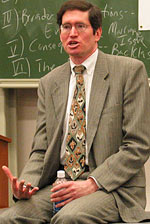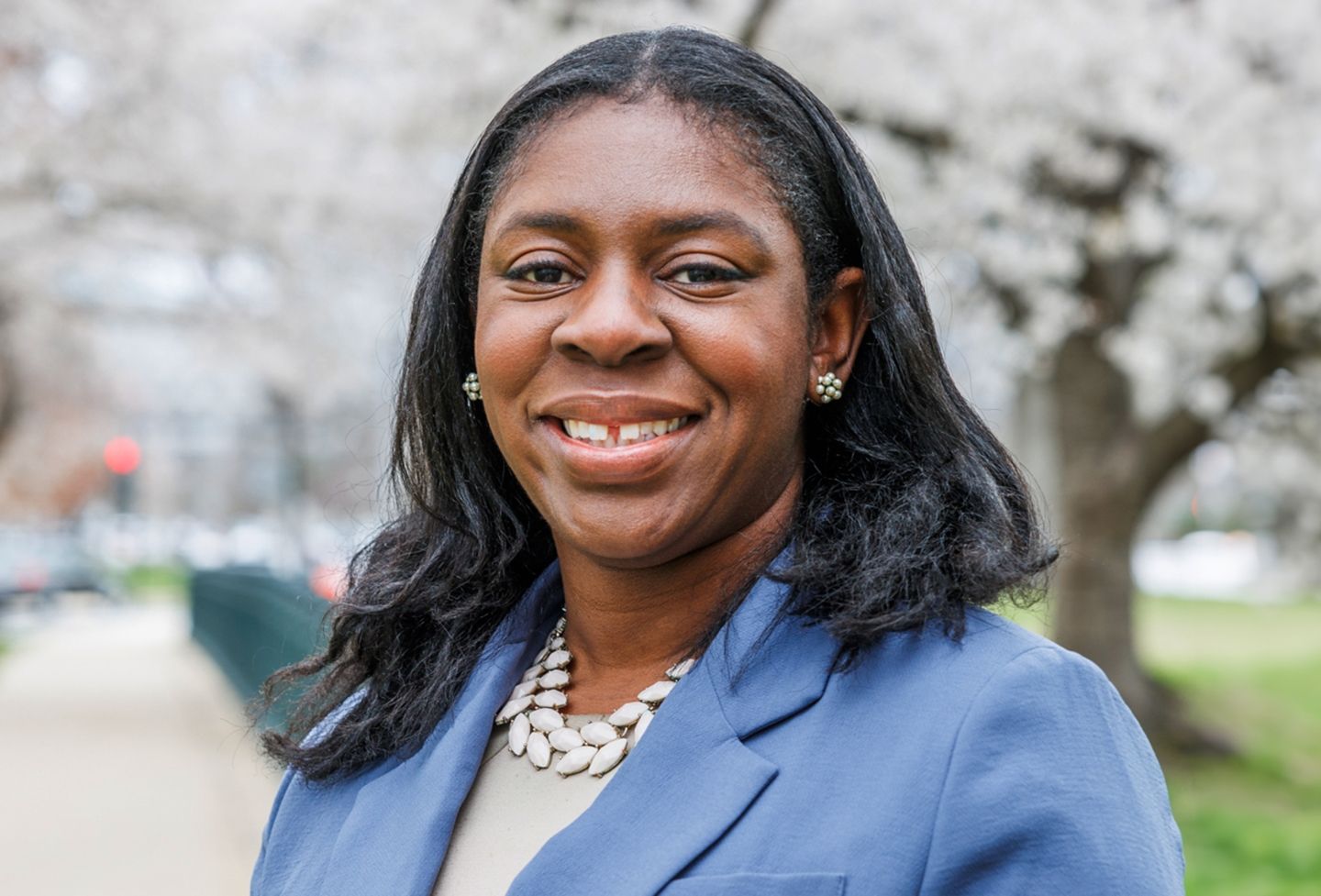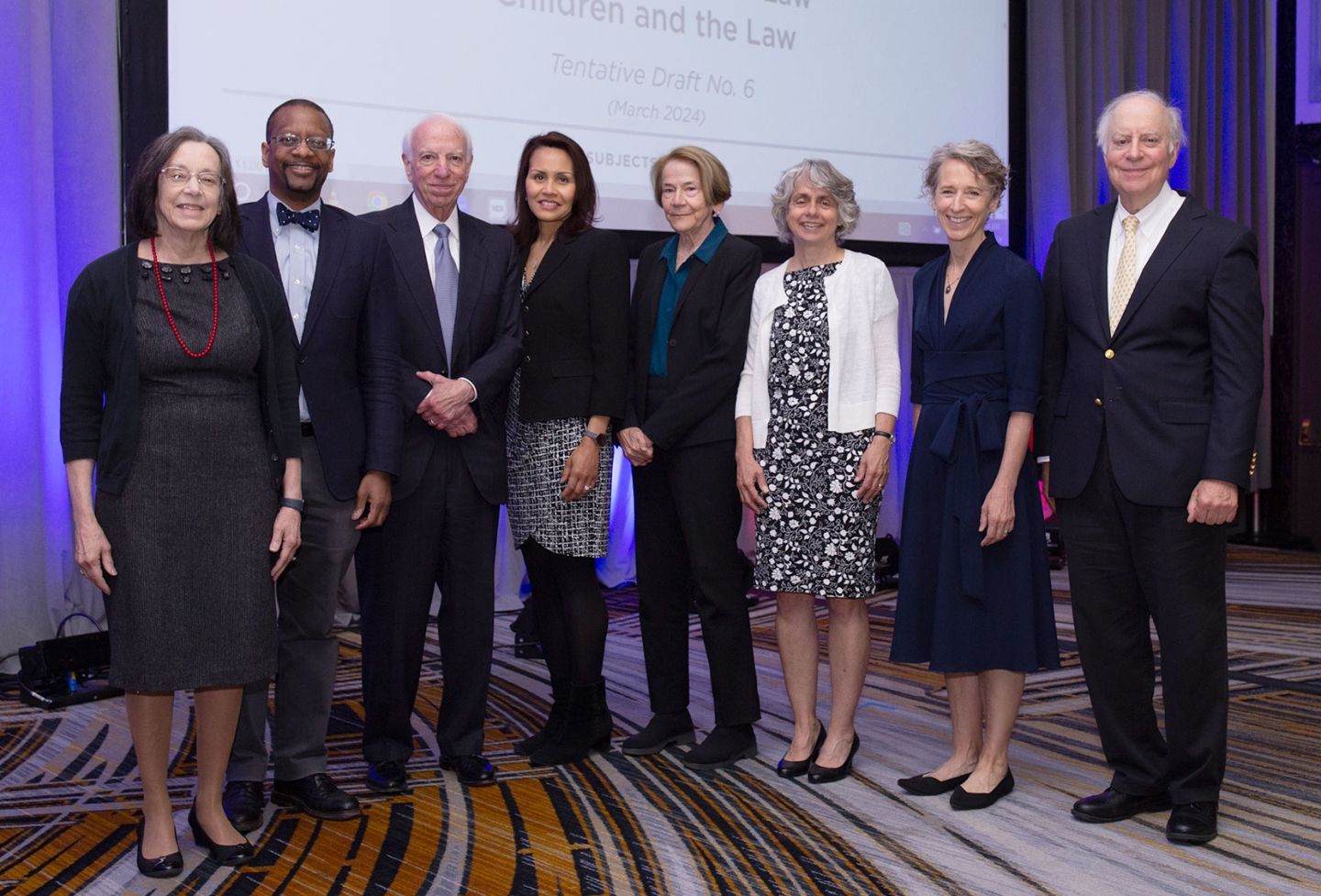Brown, Lawrence Prove Justices Weigh Their Own Beliefs, Public Opinion, Klarman Says

One case struck at the heart of the segregated South by proclaiming schools could not be separate but equal, while the other offered a mild opening feint at state laws targeting homosexuals" but Brown v. Board of Education and last year's Lawrence v. Texas reveal how Supreme Court justices weigh their own beliefs in controversial cases that are not necessarily supported by conventional legal sources, according to law professor Michael Klarman, who compared the two cases at an event co-sponsored by the American Constitution Society and Lambda Law Alliance Feb. 18. Although the Lawrence decision avoided the issue of gay marriage "just as Brown avoided interracial marriage" Klarman predicted the Court eventually would deem classifications by sexual orientation unconstitutional, as public support for gay rights continues to increase.
"Brown and Lawrence were both hard cases for the justices, I think for the same reason," Klarman explained. The justices thought they should separate their own views from the law, but they considered racial segregation so evil that they could not allow it. To them, segregation was comparable to Nazism, still fresh in their minds after World War II.
In the end, Brown "required them to give up their commitment to subordinate their personal views to the law," he said.
In the case of Lawrence, Justices Sandra Day O'Connor and Anthony Kennedy, who usually swing right, had to overturn a precedent set just 17 years ago in Bowers v. Hardwick, in which the Court ruled in favor of Georgia's law banning consensual sodomy regardless of sexual orientation.
"If you care about originalism [an issue O'Connor wavers on] … it's very difficult to justify the result in Lawrence on originalist grounds," he said. "They're not sure about the legal basis [for the decision], I think that's the same as Brown."
The Court is hardly a vanguard on the issue of homosexuality today or on desegregation during the 1950s, he said. "They're reflecting fundamental changes that are already going on in society," Klarman said. After World War II, African-American soldiers began demanding more respect for risking their lives for their country. Segregation made the United States look backward abroad, where it was competing with the Soviet Union for the loyalty of developing countries during the Cold War. It's clear from the justices' own records of their discussion about Brown "they don't think for a minute they're creating a new social reform movement," Klarman said. "They understood one was already underway."
The same is true of Lawrence: since 1986, public opinion has shifted substantially toward supporting some gay rights, although about 65 percent still oppose gay marriage. State supreme courts in Alaska and Hawaii have struck down bans on gay marriage; Episcopalians have begun ordaining gay bishops; and a strong gay rights movement has made significant gains in the past decade. "Both [Court] decisions reflect change more than I'd say they promote change," he said.
On issues such as race and homosexuality, studies show there's a correlation between elite socioeconomic status and liberal views, but in considering gays, age is a factor too — older Americans are more likely to oppose liberal attitudes toward sexual orientation. Lawrence has seen less backlash than Brown in part because most Americans agree consensual sex between adults should not be criminalized, Klarman said. Americans are far more opposed to gay marriage, just as many in the South were violently opposed to interracial marriage during the Brown era while some supported limited economic or voting rights for African-Americans. Brown struck closer to white supremacist's core beliefs than Lawrence does to the public today.
"People are most opposed to changes at one end of the spectrum and able to accept change at the other end," he said. More Americans might support laws banning employment discrimination against homosexuals or allowing gays in the military than gay marriage, for example. In comparison, Lawrence actually would have "produced a yawn of indifference" had it not been for a shift in public focus to gay marriage.
Brown notably does not ban presumptive racial classifications — it's instead written as an education case. "They were scared to touch the interracial marriage issue," Klarman said, adding that if they did, Brown would likely have been unenforceable. One interracial marriage case from Virginia reached the Supreme Court soon after Brown, but the justices ducked, saying the facts were unclear.
A similar break happened in Lawrence: "They go to great lengths to make it clear this is not about gay marriage," he said. "It's kind of unusual for the justices to tell you what the case is not about."
"O'Connor and Kennedy are not about to strike down bans on gay marriage anytime soon," he predicted. O'Connor, for one, clearly cares about public opinion. In striking down the death penalty for the mentally retarded two years ago, she noted in her opinion how many states have laws banning the practice.
The Supreme Court's most controversial decisions liberalizing law — Roe v. Wade and Brown, for example — often polarize the public further and create a backlash, when the Court would be better served by waiting until public opinion supported the decision, Klarman said.
In such cases, moderate opinion gets squelched, and the "political spectrum moves to the right." George Wallace was a moderate before Brown, and Alabama politician Big Jim Folsom destroyed his own career because he remained moderate in his beliefs.
In Massachusetts, politicians recently created a coalition in support of civil unions as a compromise position — but the state's supreme court ruled that civil unions were not equal to gay marriage.
"Courts are good at destroying those majority coalitions by saying they're unconstitutional," Klarman said. Now Massachusetts politicians can only change the gay marriage decision by amending the state constitution. As in the case of the Court's refusal to hear an interracial marriage case, the current justices are unlikely to take appeals to the Massachusetts court's decision.
This puts Democratic presidential candidates in a difficult position; they don't want to alienate a core constituency by opposing gay marriage, but 65 percent of the electorate oppose it.
"My prediction is that Bush will make this a huge issue in the election," Klarman said, and the issue will likely play in his favor.
But in Brown, violence against blacks, shown on television and seen by horrified northerners, created a counter-backlash against segregationists. "When there is violence it actually helps the movement," Klarman said, noting that the death of Matthew Shepard, a gay man allegedly murdered because of his sexual orientation, created a backlash in support of gay rights.
There won't be the same backlash against gay marriage in Massachusetts because conditions and attitudes have changed.
"The Court tends to constitutionalize the consensus and suppress the outliers," he said, pointing out that younger generations are more tolerant of gays. "I think gay marriage is in the cards."
When new justices are appointed to the court, younger viewpoints will enter as well, Klarman said, and even conservative justices will come to accept liberal views toward sexual orientation. Justice Robert Jackson predicted in 1954 that the Court was certain to invalidate racial segregation in public schools within a generation, even if it declined to do so in Brown. Social and political changes have inevitably influenced court rulings and public opinion over time.
"Within a generation … homophobia is going to look like white supremacy," an outlook that is now "alien to us," Klarman said.
Founded in 1819, the University of Virginia School of Law is the second-oldest continuously operating law school in the nation. Consistently ranked among the top law schools, Virginia is a world-renowned training ground for distinguished lawyers and public servants, instilling in them a commitment to leadership, integrity and community service.


